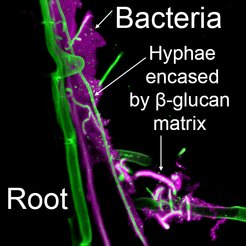β-glucans-triggered immunity and fungal counterstrategies in beneficial and detrimental plant-microbe interactions
Supervision: The project will be supervised by Alga Zuccaro at the University of Cologne.
Abstract: Fungal cell walls are targeted by host hydrolases to release carbohydrate oligomers which modulate immunity and determine the outcome of the host-fungal interaction, e.g. by acting as MAMPs (microbe-associated molecular patterns) or compatibility factors. In this regard, many studies have been focusing on fungal-derived chitooligosaccharides and their implications in symbiosis and immunity, largely ignoring the role of the β-glucan-rich polysaccharide matrix encasing fungal hyphae. Recently, we provided a thorough characterization of this outer fungal polysaccharide layer (EPS matrix) using quantitative proteomic and glycomic approaches. We identified two fungal β-glucans binding lectins, FGB1 and WSC3, from the EPS matrix and cell wall which prevent MAMP release and avoid host recognition by binding to different β-glucan structures, indicating that fungi have strategies to overcome β-glucan-triggered immunity. We also showed that plant apoplastic glucanases release a β-glucan fragment with strong antioxidant activity from the EPS matrices of phylogenetically distant fungal taxa, unveiling the hitherto undescribed capacity of this often-overseen matrix to act as an outer protective barrier important for fungal accommodation within the hostile apoplastic environment. The PhD project will focus on the mechanistic understanding of β-glucans signal perception and transduction in plant-microbe symbiosis and immunity using molecular, biochemical and cytological approaches.
Key publication: Wawra, S., Fesel, P., Widmer, H., Timm, M., Seibel, J., Leson, L., ... & Zuccaro, A. (2016). The fungal-specific β-glucan-binding lectin FGB1 alters cell-wall composition and suppresses glucan-triggered immunity in plants. Nature communications, 7(1), 1-11.
Link to the Zuccaro group homepage: https://ag-zuccaro.botanik.uni-koeln.de/

